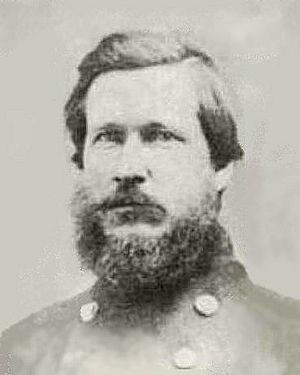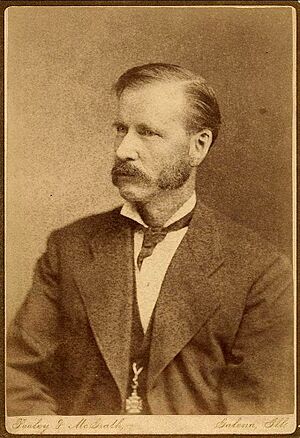William R. Rowley facts for kids
Quick facts for kids
William R. Rowley
|
|
|---|---|
 |
|
| Born | February 8, 1824 St. Lawrence County, New York |
| Died | February 9, 1886 (aged 62) Galena, Illinois |
| Allegiance | |
| Service/ |
Union Army |
| Years of service | 1861–1864 |
| Rank | |
| Unit | 45th Illinois Infantry Regiment Army of the Tennessee |
| Battles/wars | American Civil War |
| Other work | County clerk, Judge and Sheriff of Jo Daviess County |
William Ruben Rowley (February 8, 1824 – February 9, 1886) was an important figure during the American Civil War. He served as a lieutenant colonel and was a special military secretary for General Ulysses S. Grant. Later, he was given the honorary rank of brevet brigadier general.
Before the war, Rowley lived in Galena, Illinois. He was a teacher and also worked in local government. He was a close friend and neighbor to Ulysses Grant and John Rawlins. During the war, he fought in major battles like the Battle of Shiloh and the Battle of Vicksburg. Rowley was one of nine generals from Galena who served in the Civil War. After the war, he returned to Galena and continued his work in public service. He was known for strongly defending General Grant when others criticized him.
Contents
Early Life and Public Service
William Rowley was born on February 8, 1824, in Gouverneur, New York. This town is in St. Lawrence County, in northern New York. In 1843, he moved to Galena, Illinois, in Jo Daviess County, Illinois. He worked as a school teacher there.
In 1847, Rowley married Elizabeth Miller. They had four children together. He also started working for the county government. In 1849, he became an assessor and collector for Jo Daviess County. Between 1847 and 1861, he held other jobs, including deputy circuit clerk and sheriff. Rowley lived next door to John Rawlins, who would also become a key figure in the Civil War. Ulysses S. Grant and Congressman Elihu B. Washburne were also his neighbors in Galena.
Civil War Service
When the Civil War began on April 12, 1861, with the attack on Fort Sumter, news quickly reached Galena. William Rowley was among the people who gathered in town. Ulysses S. Grant and John Rawlins were also there. Rawlins later became the Secretary of War when Grant became president. After Rawlins gave an inspiring speech, Grant told Rowley that the speech "stirred my patriotism."
On November 13, 1861, Rowley officially joined the war. He was appointed a first lieutenant in Company D of the 45th Illinois Infantry Regiment. This unit was part of the Army of the Tennessee. Rowley was an important link between Grant and his political supporters in Galena, especially Elihu B. Washburne. Because Rowley was always with Grant, he knew a lot about Grant's activities. Grant sometimes used Rowley to send messages or requests to Washington.
Fighting at Fort Donelson
Rowley fought with the 45th Illinois volunteers at the Battle of Fort Donelson in February 1862. General Grant's army captured this important Confederate fort. After this victory, Rowley was promoted to captain. He then joined Grant's personal staff as an aide-de-camp. Grant had been promoted to major general and chose Rowley, his friend from Galena, as one of his aides.
The Battle of Shiloh
Rowley also took part in the Battle of Shiloh in April 1862. This battle was very costly for the Union army. General Grant faced a lot of criticism in newspapers because of the surprise attack and heavy losses. Grant believed that General Lew Wallace had not followed orders, which caused delays.
Grant sent Rowley to find Wallace and tell him to bring his troops to the front lines immediately. Rowley found Wallace and explained the serious situation. Wallace was surprised by the news and quickly moved his troops to the battlefield. Later, in his autobiography, Wallace wrote about his meeting with Rowley. Rowley and another officer, Douglas Putnam, later confirmed Grant's account of these events.
After the battle, rumors spread that Grant had been drinking. Rowley and other officers who were with Grant strongly disagreed with these rumors. They said that Grant was performing well. Rowley wrote letters to defend Grant. In one letter, he called the stories "an unmitigated slander." He stated that he had been with Grant every day and had never seen him drink much or be intoxicated.
Rowley also wrote to Congressman Washburne about the battle. He said that the stories about Grant were false. He explained that General Henry Halleck, a higher-ranking officer, approved of Grant's actions. Rowley believed that Grant's efforts, along with his officers, helped turn a possible defeat into a great victory.
Other officers, like John Rawlins and Colonel John E. Smith, also supported Grant. They said the rumors were untrue and came from people who were jealous. Rowley was later promoted to Major General of Volunteers. He also served as a Provost Marshal General in 1863.
Vicksburg Campaign
Rowley was also involved in the Vicksburg Campaign in the spring of 1863. This was another major victory for Grant. Rowley was promoted to Lieutenant Colonel and became Military Secretary on Grant's staff in March 1864. He stayed in this role until his health declined in October 1864, after the Wilderness campaign. He then had to leave the army.
Life After the War
After his military service, William Rowley returned to Galena. He worked as the Jo Daviess County Circuit Clerk until 1876. Later, he became a judge for the county court. In July 1866, he was given the honorary rank of brevet Brigadier General of volunteers, based on Grant's recommendation.
Rowley remained good friends with Wilbur Crummer, a fellow soldier. They often talked about their experiences during the Civil War. Crummer wrote a book in 1915 where he mentioned that Grant's enemies spread false stories about him. Crummer noted that whenever these stories came up, Rowley would get angry and say, "All a damned lie."
In June 1880, while the Republican Convention was happening, former President Grant was living in Galena. Grant would often visit Judge Rowley's office to talk. They discussed Grant's recent world tour. During the convention, Rowley's office received many telegrams about the presidential nomination. While Rowley was very interested, Grant seemed calm. However, news arrived that their old friend, Elihu B. Washburne, was withdrawing his support for Grant and making negative comments. This ended their long friendship. While Grant remained calm, Rowley and others strongly criticized Washburne for his actions.
William Rowley spent his last years in Galena. He passed away on February 9, 1886, at the age of 62. He is buried in Galena's Greenwood Cemetery.
Images for kids
 | Percy Lavon Julian |
 | Katherine Johnson |
 | George Washington Carver |
 | Annie Easley |



